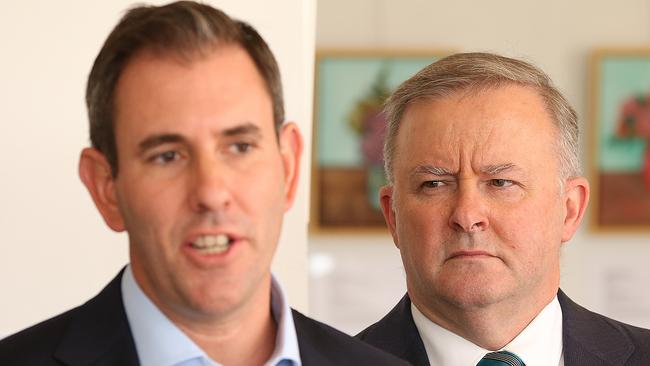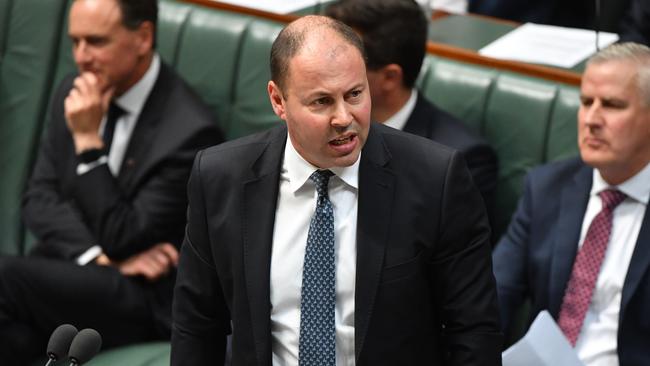James Morrow: Why Labor’s wellbeing budget won’t work
If Labor really wants to improve lives for Australians they should cut ridiculous policies that make our lives harder, not sell us a new-age wellness budget, writes James Morrow.
Rendezview
Don't miss out on the headlines from Rendezview. Followed categories will be added to My News.
Labor clearly thinks itself in with a chance at the next election.
How can you tell? They’re already talking down the economy.
Or, rather, they’re talking down the importance of the economy as we traditionally think of it – because, after all, there’s more important things than GDP, right?
Like a kid softening the parental ground for a bad report card by talking up unfair teachers and how, after all, marks don’t really measure passion for a subject, this week opposition Treasury spokesman Jim Chalmers put it out there that we might want to consider a “wellbeing budget”, a la Jacinda Ardern’s New Zealand.
The point, said Chalmers in a speech to the left-wing Australia Institute, is to “(redefine) what success means in terms of economic outcomes.”
Rather than just dealing with the cold hard facts of GDP, a “wellbeing budget” would be about not just hitting concrete KPIs like “improving mental health, reducing child poverty (and) addressing the inequalities faced by indigenous people” but also fuzzier goals like “thriving in a digital age”, whatever that means.

On one level, Chalmers is right. No one wants to be any more of a slave to the forces of profit and loss than we already are, and it would be a pretty dreary life if all our work and play were dedicated to pleasing the gods of the market.
A key factor behind the so-called populist movements that backed Donald Trump and Brexit and which see Bernie Sanders leading the polls for the Democrats in the US is a disenchantment with a world where so-called elites have let loyalty and family and even nation be steamrolled by the financialisation of everything.
But on another level, come on.
This is the same party that hasn’t delivered a surplus since 1989. So it’s not hard to see how some airy-fairy measure of “wellbeing” could be trotted out as a “yes, but!” come the announcement of a record deficit in some future May budget.
And no matter how worthy, none of the things that Chalmers spoke about by way of improving our national wellbeing sound like they come cheap. If history is any guide they will come with new expensive agencies, campaigns, websites, and in the worst cases, additional taxes and levies.
So here’s an idea: Instead of trying to improve our general wellbeing by spending more of the money which we as Australians work so hard as individuals to earn, and using various taxes to make us “do the right thing” and eat our metaphorical vegetables, why not go the other way?

It may sound crazy, but when it comes to wellbeing, just maybe individuals and families know what’s best for them, and our overall happiness might be increased by winding back rather than increasing the role of the government in helping us to find our bliss.
So, here are a few modest proposals should Labor (or anyone else) be interested in improving our wellbeing without intruding further into our lives – or wallets.
Scrap the Luxury Car Tax
This week Australia finally said its last, sad goodbye to Holden, but the protectionist measures imposed years ago to keep the local auto industry afloat look set to remain for the foreseeable future, with Treasurer Josh Frydenberg kyboshing any suggestions in that direction this week.
The tax, which cuts in on imported cars retailing for more than $67,525 including GST raises a relative pittance – and rather than highrolling Bentley drivers, it hits families looking for a big, safe family vehicle the hardest.
Last February, a study by CarAdvice found that Toyota buyers wound up paying the most luxury car tax thanks largely to the popularity of Land Cruisers, Prados, and Klugers. Yet drivers of smaller, sportier and posher European marques escape the tax, due to carve-outs for efficiency.
Perhaps it shouldn’t be called a luxury car tax as much as a family car tax.

Give us control of our super
When compulsory superannuation system was brought in, it seemed like a godsend that would allow Australians to retire in comfort and take pressure off the pension.
Now, the opposite is happening.
Instead of giving Australians control of their money, it effectively acts as a pay cut that helps prop up share markets while reducing the amount of money we have individually each payday.
It’s hugely costly in terms of compliance and has created a gravy train for fund managers (and unions, through their own funds). And far from getting people off the pension, according to the University of Sydney’s Cameron Murray writing in The Conversation, “Many financial planners advise intending retirees to spend a lot of their super quickly in order to shelter it in income-test-exempt assets such as housing and qualify for the pension.”
Put alcohol taxes on hold
While some may say this proposal is blatantly self-interested, anyone who has travelled overseas knows that our drinks are obscenely overtaxed.
Last November an academic at the University of Adelaide ran the numbers and found that among 40 countries, we taxed our spirits fourth highest and our beer sixth highest among nations.
Why is this a problem? After all, alcohol can do damage to individuals and society, and there is a clear case for its restriction, right?
Except that in moderation alcohol can be good for one’s health, and the socialisation that comes from going to a pub builds all sorts of good things like human connection and community.
And human nature being what it is, people will always look for a fix – by making alcohol more expensive than many drugs, the drugs become the option of choice. This newspaper has reported that a slab of beer can cost more than a hit of ice, and the same economics apply to the deadly party drugs which many young people choose to take especially during the summer festival season.
Sadly, no government is likely to take up any of these suggestions any time soon.
But if they do, make sure you haven’t enjoyed a cheap schooner before getting in your new un-luxury taxed people mover.
James Morrow is the Opinion Editor of The Daily Telegraph.
Originally published as James Morrow: Why Labor’s wellbeing budget won’t work



